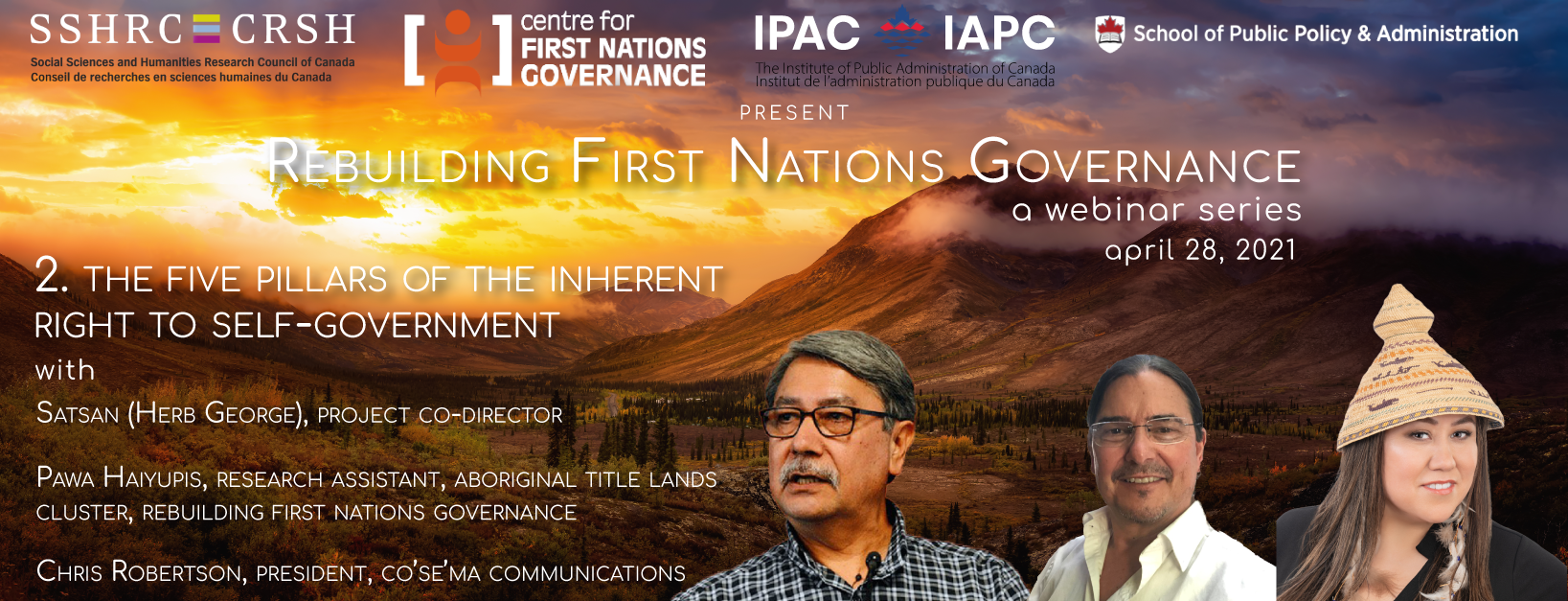
What makes an effective self-governing First Nation and what does it take to get there? Let the team from the Centre for First Nations Governance walk you through the five pillars and seven principles for effective self-governance: people, land, laws and jurisdiction, governing systems & resources. This made-for-Canada model was developed through extensive consultations with First Nations citizens, leaders, elders, academics and on-the-ground facilitators associated with the Centre. Satsan, Chris Robertson, and Pawa Haiyupis will explain the framework as well as share their experiences working with communities to transition from Indian Act administration to self-government.
Effective self-governance is critical to the survival, health and well-being of First Nations people. It is a central pillar in reconciliation and in the creation of a new nation-to-nation relationship with the Crown. It is crucial to the long-term governance of Canada.
Join us April 28, 2021 at noon ET for the second in our series of five one-hour webinars in 2021 exploring the themes behind Rebuilding First Nations Governance (RFNG) – a First Nations community-led, multi-partner, SSHRC-funded research project to find pathways out of the Indian Act and into exercising the inherent right of First Nations to self-government.
This series will be of primary interest to First Nations leaders, administrators, and citizens who want to learn about their inherent rights; how the Indian Act obstructs their ability to develop effective self-governance and take their rightful place as citizens within their own nations and within Canada; and the power that First Nations’citizens have to transform the way their nation is governed.
These webinars will also be of interest to other levels of government and all those interested in learning more about the systemic issues behind present day challenges in Crown-First Nations relationships and are willing to explore and support alternatives for true reconciliation.
Register for April 28 with IPAC at: https://t.co/tE5jTiJzWl?amp=1
BACKGROUND:
Rebuilding First Nations Governance (RFNG) is a national alliance of First Nation communities and Tribal Councils, academic researchers and public sector practitioners created to support First Nations leadership and rights holders that have made the decision to transition out from under the Indian Act to their own inherent rights governance. This six-year applied action research project is supported by a $2.5M SSHRC Partnership Grant.
Through a process of community-led research, reflection and action, the project aims to help communities replace the Indian Act with effective and legitimate First Nation governance based on the strategic direction of the community. The research emerges from the priorities identified by the rights holders – the people. It will help Nations reclaim Indigenous forms of decision-making and revitalize Indigenous governance practices.
Led by project co-founders Satsan (Centre for First Nations Governance), Frances Abele (Carleton University) and Catherine MacQuarrie, RFNG includes partnerships with six First Nations and two Tribal Councils, six Canadian universities, three non-governmental organizations including the Institute of Public Administration Canada (IPAC) and 35 academic researchers and practitioners.
The five-part webinar series scheduled over 2021 will explore the underlying themes of the project and the work with First Nations communities that are on the path to exercising their inherent right to self-government. The sessions are hosted by IPAC. The scheduled dates and topics are:
- March 3: “A dream of our people for going on eight generations” (available now at https://carleton.ca/rfng/webinar-series/)
- April 28: The five pillars of the Inherent Right to Self-Government
- June 23: The “ill-fitting boot” – the origin and content of the Indian Act
- September 22: It’s A “Full Box”. The Historical Struggle for Recognition of Aboriginal And Treaty Rights
- November 17: From theory to practice: Principles and Strategies for Implementing the Inherent Right to Self-government